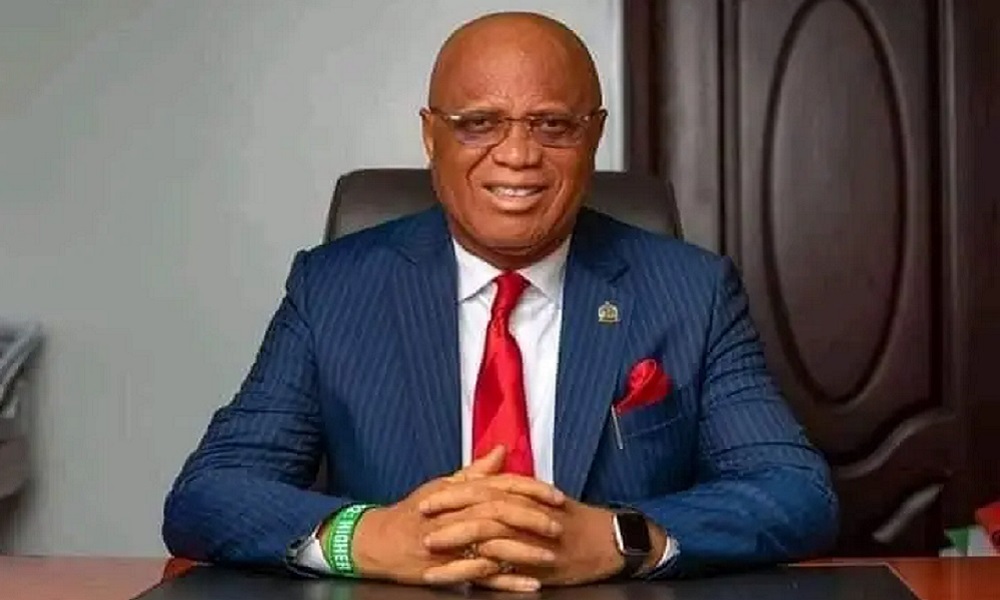News
Money goes to them directly,’ Nigerian governor denies tampering with LG funds

Governor Umo Eno of Akwa Ibom State, South-south Nigeria, has denied interfering with funds meant for local government areas in the state.
He, however, said he was interested in knowing what local councils do with the money.
“I stand here to say I have not interfered with their businesses. As their money comes, it goes to them, but we also want to know what they do with the money, that is the only thing we do.”
Mr Eno stated this last week at Uyo Township Stadium while delivering his first-anniversary speech.
“The chairperson of the Association of Local Governments of Nigeria (ALGON) is here. But they’ve been doing their work. We just ensured we worked with them to ensure they deliver on their mandate,” the governor said.
Funds meant for local government areas in the Federation Account are channelled to them via state and local government joint accounts, where governors have controlling powers over the amount of money that should be released to the local councils in their states.
The practice, which has existed for decades, has prevented local governments from functioning as an independent tier of government and has triggered calls for local government autonomy.
But Governor Eno, who just marked his first year in office, claimed “he allowed local governments to run on their own”.
“Their money goes to them directly,” Mr Eno said. “We just ensure we work with them, to make sure they deliver on their mandate,” he added, suggesting that the third tier of government is not completely independent of his control.
Mr Eno made the statement a few days after the federal government filed a suit at the Supreme Court against the 36 state governments. The suit is seeking the enforcement of full autonomy for the 774 local government areas in the country.
The plaintiff in the suit – the Office of the Attorney General of the Federation and Minister of Justice – is asking the court to issue an order preventing state governors from embarking on unilateral, arbitrary, and unlawful dissolution of democratically elected officials at the local government areas.
It also prayed the court to make an order permitting funds standing in credits of local governments to be paid to them directly from the Federation Account in line with the provisions of the Constitution as against the “unlawful” joint accounts created by the governors.
Some states in the country, including Akwa Ibom, at the expiration of the tenure of the elected council officials, set up a caretaker committee to oversee the affairs of the council pending when elections would be conducted.
Governor Eno’s administration has just extended for six months the tenure of the caretaker administration in the local government areas in Akwa Ibom.
In the suit, the Minister of Justice, Lateef Fagbemi, among other requests, is asking the Supreme Court to stop governors from further setting up caretaker committees at the local government levels in violation of the constitutionally recognised democratic system.
Mr Fagbemi further prayed the court to issue an injunction restraining governors, their agents and privies from receiving, spending or tampering with funds released from the Federation Account for the benefit of local governments where no democratically elected officials exist in the areas, PREMIUM TIMES reported.
The local government, as a third tier of government, is meant to cater for the people at the grassroots, but the performance of the local leaders is generally poor across the country because of the overbearing influence of state governors who tampers with funds meant for them, a development that has crippled governance at the grassroots.
Former President Muhammadu Buhari, in December 2022, accused state governors of pilfering funds meant for local governments.
The Nigerian Senate last December urged the federal government to stop the allocation of funds to local governments run by caretaker committees.
PREMIUM TIMES has reported how state governors fought against a move by the Nigeria Financial Intelligent Unit to abolish joint accounts where governors exercise powers over funds meant for local governments.
Because the Akwa Ibom governor, like his counterparts in other states, has great influence over the election or appointment of local political leaders, local council officials are always reluctant to publicly admit that the governor tampers with funds meant for local councils.
People familiar with how the state and local government joint account in Akwa Ibom is being operated said the state government has been taking credits for many projects executed with the local government funds.
The Akwa Ibom State Government, for instance, takes credit for free education at the primary school level even when local government funds are used to pay the salary of primary school teachers.
The state government also takes credit for purchasing SUVs for paramount rulers in the various local government areas of the state, even when the money for such purchases is deducted from the local council’s funds.
Also, the state government appoints members of the Local Government Service Commission, whose salaries are paid with local government funds. The functions of the commission include the recruitment, promotion, and transfer of local government workers.
We gathered that these monies are deducted during the meeting of the joint account, after which whatever is left is then shared with the local government councils.
A council official, who preferred to be anonymous, said that “generally acceptable deductions” are made during joint account meetings.
“The money they deducted – centrally, (are) for payment of local government teachers’ salaries, pensions and gratuities. After all these payments, including traditional rulers and some other things, what is left is what they hand over to you.”
The official said the practice began during the administration of former Governor Godswill Akpabio (now Senate President), where Victor Antai (now Executive Director, Project NDDC) served as commissioner for Local Government and Chieftaincy Affairs.
“Members of ALGON moved a motion that because some local governments are insolvent – for example, the number of primary schools in Uyo Local Government Area, the funds that come to Uyo will not be able to pay teachers entitlements.
“They moved a motion that all local governments be taken into consideration. For instance, a place like Esit Eket Local Government Area that has huge allocation but with very few bills to pay will have too much excess money, while Uyo and Ikot Ekpene local government areas will not have.
“So, they put (allocations of the 31 LGAs in the state) in a pool, use certain indices to make sure that every central payment is being handled at the state level, including salaries, pensions and gratuities of primary schools teachers, local governments staff members and traditional rulers as would have been paid by the local governments.
“They remove it at (the) source and pay directly to prevent a situation where some local governments would pay while others do not. It is after all these deductions that they now tell you that after these deductions, this is what is left, and they now handed it over to you to run your council,” the official said.
“It is not given on an equal basis. There are certain indices because what also comes in is not equal,” the official said when asked if what is left is shared equally by local governments.
The sharing strategy, as explained by the council official, suggests that the practice of lumping the federal allocations accruing to the 31 local governments in a pool for central deductions places local government areas like Uyo and Ikot Ekpene in an advantageous position.
The two local government areas, apparently non-oil producing, do not get as much money from the federation account as some local government areas in the oil-rich Akwa Ibom.
However, these two cities are densely populated and enjoy more revenues from businesses than other local governments, particularly those in rural areas, which do not, a development that renders the practice of making general deductions from the pool a disadvantage to other local government areas.
Also, as stated by the official, Uyo and Ikot Ekpene local government areas have the largest number of primary schools as well as teachers population, making payment of salaries a burden to them, particularly when the state government takes credit for free education at primary school level but uses local government funds to pay teachers entitlements.
News
Trump Congratulates First American Pope, Leo XIV

United States president, Donald Trump, has congratulated cardinal Robert Prevost on his election as the new Pope, Leo XIV.
In a post on his Facebook page, Trump expressed excitement over the development and described the election as an honour to the American people.
“Congratulations to Cardinal Robert Francis Prevost, who was just named Pope. It is such an honor to realize that he is the first American Pope.
“What excitement, and what a Great Honor for our Country. I look forward to meeting Pope Leo XIV. It will be a very meaningful moment,” he stated.
White smoke rose from the chimney above the Sistine Chapel in Vatican City, indicating the election of a new pope.
Robert Prevost is to be addressed as Pope Leo XIV.
News
Akpabio drags Natasha to court over satirical apology

Senate President Godswill Akpabio has petitioned the Federal High Court in Abuja to compel suspended Kogi Central Senator Natasha Akpoti-Uduaghan to delete a satirical apology she posted on her social media pages.
On 27 April, Akpoti-Uduaghan shared a short video in which she mockingly apologised to Akpabio, claiming it was for not allowing him to have his way with her.
Akpoti-Uduaghan stated she was ‘sorry for the crime of maintaining dignity and self-respect’ and for rejecting the advances of the Senate President, whom she implied believed no one could refuse him.
The dispute between the two senators stems from an altercation in the Senate chamber over seating arrangements.
This led to Akpoti-Uduaghan initiating a suit that sought to stop the Senate from investigating her for alleged misconduct.
In particular, the senator asked the court to prevent the Senate Committee on Ethics, Privileges and Public Petitions, chaired by Senator Neda Imasuen, from taking any disciplinary action against her.
Akpoti-Uduaghan was later suspended following her accusations against the Senate President, accusing him of sexual harassment.
The presiding judge, Justice Binta Nyako, on 4 April 2025, restrained all parties involved in the suit from making public comments about the ongoing case.
Meanwhile, Akpabio’s legal team, led by Kehinde Ogunwumiju, has filed a fresh application asking the court to direct Akpoti-Uduaghan to delete the video, arguing it violated a judge’s directive.
In his application, Akpabio’s lawyer also requested the court to order Akpoti-Uduaghan to remove the post from all her social media accounts.
Additionally, Ogunwumiju urged the court to mandate Akpoti-Uduaghan to publish a written apology in at least two national newspapers and file an affidavit confirming her compliance.
News
Real reason APGA snubbed Obi, adopts Tinubu

Governor Charles Soludo of Anambra on Thursday announced that the All Progressives Grand Alliance, APGA, has officially adopted President Bola Tinubu as its candidate for the 2027 presidential election.
Mr Soludo made the announcement at Alex Ekwueme Square in Awka during the President’s working visit to the state.
According Mr Soludo, APGA and the All Progressives Congress, APC, will work together, as both parties share a common belief in progressivism.
Mr Soludo said: “Progressives are working together.”
Earlier, the President described Mr Soludo as a competent governor.
While inaugurating several major projects executed by the Soludo administration, the President described Mr Soludo as a friend and a visionary leader.
He said: “I am honoured to be here. I commend my friend, Governor Chukwuma Soludo, who is a visionary and competent leader for the work he has been doing in Anambra State.”
The projects set to be commissioned by the President include Emeka Anyaoku Center at Nnamdi Azikiwe University, the new Government House, the Solution Fun City, and the 8-lane Aroma–Government House Boulevard in Awka.
-

 News14 hours ago
News14 hours agoBREAKING! Finally, White Smoke Emerges From Sistine Chapel as Vatican Elects New Pope
-

 News18 hours ago
News18 hours agoBreaking: Three Serving PDP HoR Members Defect to APC
-

 News20 hours ago
News20 hours agoFinally, IMF deletes Nigeria from its debtors list
-

 News18 hours ago
News18 hours agoEx-Governor Uduaghan, Daughter Dump PDP, Join APC
-

 News13 hours ago
News13 hours agoMeet the new Pope, Pope Leo XIV +Photo
-

 News19 hours ago
News19 hours agoBREAKING: Court Quashes MultiChoice Request To Uphold ‘GOtv, DStv Price Increases’ In Nigeria
-

 News16 hours ago
News16 hours agoTwo Abuja co-wives hospitalised after taking herb to s3xually arouse their husband who married third wife
-

 News18 hours ago
News18 hours agoPolice demote officer, reprimand two others for assault in Imo





